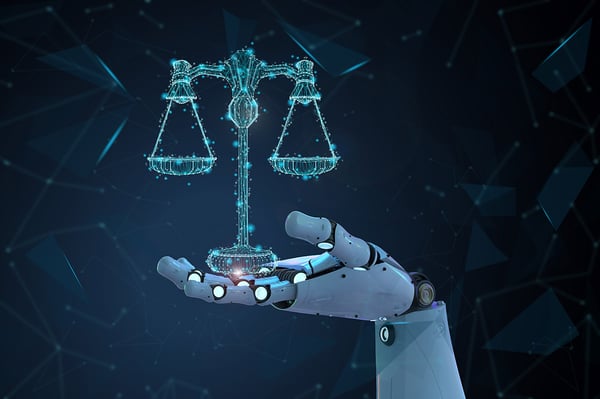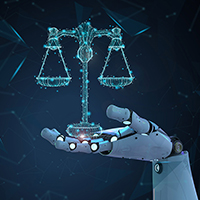As companies look for ways to work smarter and faster, the use of artificial intelligence (AI) in complex fields like law increased by nearly a third in 2020. Such widespread adoption of new technology naturally raises questions: Just because we can turn to AI for solutions, should we? Can a robot lawyer, for instance, litigate emotional divorce proceedings in family court or understand the full impact of a car accident on a person’s life in a personal injury claim?
In truth, the complex technology that would be required to provide direct legal services to clients does not exist. However, there are exciting new AI applications that lawyers are leveraging to provide top-level service at previously unimaginable speeds. For these applications, ethics are less of a consideration because lawyers serve as gatekeepers to retain their firm’s standards of practice. At any intersection of artificial intelligence and law, though, ethical considerations are sure to arise for the foreseeable future.

What Are Current Ethical Considerations for AI and Law?
Artificial intelligence is a domain where technology outpaces the law. When an autopilot vehicle crashes, who is liable? Who owns the built-in data captured by smart cars? How secure is your identity as social media bots auto tag your face? Here are some of the ethical questions raised by widespread adoption of AI in the legal sphere.
How much do lawyers need to know about the technology they’re using?
While lawyers cannot know all the intricacies of AI systems, they are required to possess basic competencies. Attorneys using AI are responsible for monitoring the training and application of the algorithm. Just as a lawyer oversees subordinates like junior lawyers and paralegals, the same oversight is required in monitoring the performance of AI-based tools. Some tasks may not be appropriate for AI handling, so the lawyer must determine where to draw the line between automation and augmentation.
How secure are the AI platforms?
Confidentiality is an ever-present concern, particularly given the rise of data breaches in recent years. Lawyers will need to consider where the natural-language processing is taking place—whether behind the law firm’s extensive firewall or on a vendor’s server. Privileged information must be adequately protected (with multi-factor and two-factor authentication for secure user log-in) and aligned with the NIST Cybersecurity Framework.
Can robots “practice law” without license?
Legal tech companies have faced challenges in overstepping their boundaries. In 2017, LegalZoom paid an out-of-court settlement for “unauthorized practice of law,” “false advertising,” and “unfair competition.” While it is altogether legal for companies and law firms to use technology to improve their practices, AI applications become problematic when they offer legal advice.
Are robots inheriting our biases?
Artificial intelligence operates by absorbing large amounts of data that often include past decisions made by real people with real biases and inclinations. Any statistical process will assume patterns of decision-making—but are those patterns fair? While human fallibility seems inextricably linked to such data, the biases reproduced by machines become obvious quickly and are easier to remedy than the biases of their human counterparts. The trend toward explainable AI has led programmers to devise clear models for how answers are generated. The “right to explanation” could well become a legal requirement in the near future.

The Future of Ethics for Artificial Intelligence and Law
Artificial intelligence has captured recent headlines for empowering citizens to bypass law firms by using an app that seeks fully automated claim resolution. While this form of technology opens doors to people who could not previously afford legal services, its applications are limited. Rather, most of the ground-shaking technology these days is not aimed directly at clients; instead, these artificial intelligence innovations are tailored to increase the efficiency of global law firms and corporate legal departments.
As more law firms and corporate legal departments recognize the increased efficiency that AI provides, the technology will steadily transition from a cutting-edge innovation to the new technological standard in law. In response, ethical considerations will also evolve as the legal field adapts to a new environment where artificial intelligence is tightly coupled with the practice of law.
The points below provide a glimpse into ethical considerations in law once AI is established as a standard application in the field.
AI could become a required competency for lawyers.
Competence is the first rule for attorneys. The American Bar Association’s (ABA) Model Rule of Professional Conduct Rule 1.1 states: “A lawyer shall provide competent representation to a client.” To do so, the lawyer must possess the legal knowledge, skill, thoroughness, and preparation necessary to preside over a particular case.
In 2012, the ABA amended Comment 8 to Rule 1.1 to read: “... a lawyer shall keep abreast of changes in the law and its practice, including the benefits and risks associated with relevant technology.” As David Curle of Thomson Reuters explains, “Large numbers of lawyers don’t take this duty to keep up with technology seriously enough. It’s not just AI-based technology but even more mundane things like practice management platforms, and other tools that make it easier and more efficient to practice law.”
Lawyers may need to defend a decision not to use technology.
ABA Model Rule 1.5 requires lawyer fees to be reasonable. Increasingly, technological implementations reduce labor hours, which saves lawyers from unnecessary work and saves clients from unnecessary fees. As AI technology becomes more widespread in law, it may become difficult for lawyers to bill their clients a reasonable fee without leveraging artificial intelligence technologies.
Ethical questions like these will continue to develop as artificial intelligence becomes more common in the legal field.
Artificial Intelligence Is Setting a New Standard in Law
While ethical or technological limitations may prevent robots from ever sitting down at the negotiating table or arguing in a courtroom, AI brings enormous transformative potential to law firms by eliminating time-consuming and resource-draining work.
Artificial intelligence has emerged as a powerful tool to set new standards of efficiency as lawyers fulfill their ethical commitment to serve clients with the utmost diligence, expediency, and care. Currently, we may think of AI as an industry disruptor, but in a few years, AI will simply be a best practice and an essential tool employed by the best law firms and corporate legal departments around the world.
LexCheck’s AI-powered contract negotiation platform can help you return a fully reviewed contract in just minutes. To learn more, try a free demo or contact us at sales@lexcheck.com.


